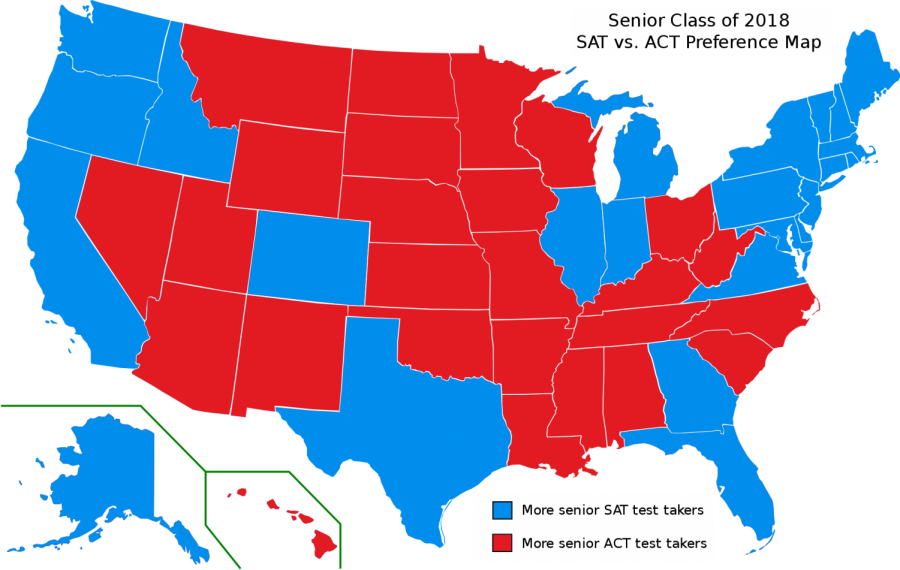Students Burdened by the College Board
Based on geography, there is limited competition between the SAT and ACT.
If you are a sophomore, you may be planning to take the PSAT or an AP test in the near future. As a junior, you may register for the PSAT, SAT, AP tests, or even some SAT subject tests. Seniors can take a final round of SAT and AP tests. All of these exams are administered and created by a single organization: the College Board.
The SAT, and standardized tests in general, are an important application component for any college-bound student. Most colleges require freshman applicants to submit SAT or ACT scores, and 87 percent of schools say that test scores play at least a considerable role in their decisions, according to a National Association for College Admission Counseling study.
Even though students dread spending hours of their Saturday mornings taking these tests, it has become a fact of life. Generally speaking, many college-bound students find it unfair that a single test can have so much clout in the admissions process.
Founded in 1899 as the College Entrance Examination Board, the College Board has built up a reputation for itself over the past century. Most recently, its repute has been negative, due to alleged reuse of tests, a poorly designed June 2018 SAT, and the creation of a monopolistic market.
In 2015, the College Board had $77 million in profits and $834 million in net assets, according to Reuters. Despite the large amount of revenue, the College Board says it intends to reinvest all profits.
According to their website, the College Board is a “not-for-profit” organization. This wording diverts from what one would normally call a 501(c) organization, a nonprofit. Though nonprofits and not-for-profits may file their taxes the same way, it is generally understood that not-for-profits are run by volunteers, who do not have a salary.
Aside from what money is already being “reinvested,” their executives benefit from the extra revenue. From the most recent data available, College Board’s president made nearly $900,000 in salary, benefits, and perks. A dozen executives made more than $300,000 in salary and benefits, according to CNN.
With these enormous salaries, the College Board is by no means a not-for-profit organization, because higher-up administration makes excessive amounts of money. Because the College Board hires and pays individuals, the institution is more of a nonprofit by nature. The company itself could never run with volunteers only, but is it really necessary to pay someone just shy of $1 million a year?
The patrons of this business are undoubtedly students and their families. By paying for these services, we are funneling money into the College Board staff’s gargantuan pay checks.
“[Taking AP Tests] has become a dilemma for a lot of students because they want AP classes on their transcripts, which is great because the courses really challenge students,” AP social studies teacher Mr. Thomas Beaupre said, “But it has become a cat and mouse because a lot of schools don’t want to accept the scores. Colleges require a [score of] four or five. It creates a lot of financial issues for students.”
I conducted a survey, in which I sent out questions to all seniors to see how many tests and other College Board services they took advantage of from January 2018 to November 2018. On average, of the 30 seniors who responded, they took two SAT tests, one Subject test, two AP tests, and sent two Score-Sends and two CSS Financial Aid profiles to the colleges of their choice.
In just under a year, the average Southern Lehigh High School senior paid $429 to the College Board. Unfortunately, this does not include the price of transportation costs, study books, and test preparation courses all associated with the SAT.
Only 15 percent of SLHS seniors surveyed view the College Board positively, while 60.7 percent had a negative view. The remaining 14.3 percent reported their view as “other.”
“[Unless you pay,] the College Board won’t even let you have access to which questions you got wrong,” junior Jessica Beltz said, “I want to know how to do better, but I don’t want to have to pay the extra money.”
Test preparation courses create another uneven playing field. Though there are free options, such as Khan Academy and YouTube videos, in-person tutoring is often an effective investment for students and their families. Prices from private companies vary dramatically, but the College Board offers their own SAT book for around 20 dollars and an online prep-course for 70 dollars. That’s more money going to the same people.
The AP Tests assess students on courses taught by high school teachers, and therefore provide a higher level of fairness than the different preparation options for the SAT Tests. All students sit in a classroom for approximately the same amount of time with a real teacher. Even though this method benefits all students, money is still a factor, because the College Board sells AP Test prep books.
“I would say that AP Biology has changed. [The College Board] made a move away from factual information and have gone for a more thematic approach, which benefits students,” AP science teacher Mr. Edward Sinkler said. “Personally from teaching AP Biology here [at Southern Lehigh], I don’t get enough time. There’s not enough class time [to prepare for the test]. It’s hard specifically for the sciences.”
In order to lessen the overpowering control that the College Board has, American institutions of higher education should encourage and accept both the SAT and ACT. The ACT is the only competitor to the SAT. In the past, the SAT has been taken by more students on the East and West Coasts; the ACT holds reign of the Midwest and South. Encouraging competition between these two organizations will better the quality and management of both tests.
“The College Board is a monopoly because they don’t compete against other [testing services] at all,” senior Ryan Sheats said. “All the students are negatively affected, because there isn’t a free market. The College Board has both AP Tests and [SAT] Subject Tests, but they are the same thing.”
Unfortunately for students, there are no other competitors for the SAT Subject, AP, and PSAT Tests. Only time will tell when a smaller company will challenge the monopoly of the College Board in these fields.

Senior Bridgette Lang is a third-year staff reporter and former features editor, now serving as opinion and our world editor for the Spotlight. In addition,...



